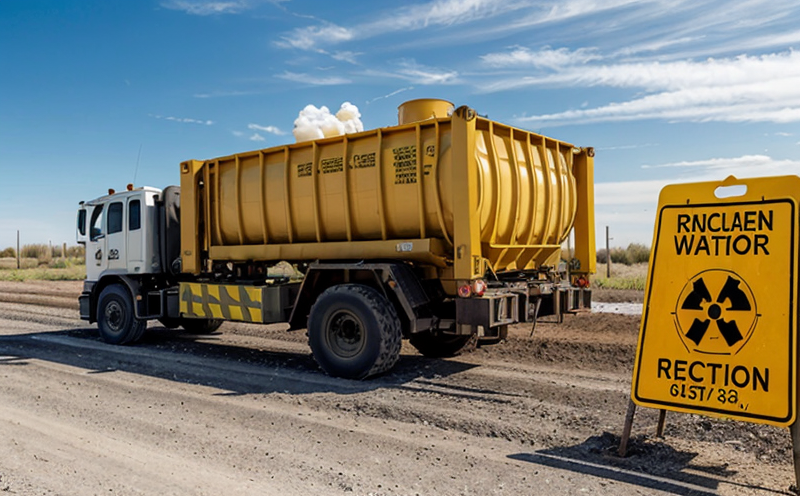ASTM D7284 Monitoring of Radon Emissions from Radioactive Waste
The ASTM D7284 standard method is specifically designed to monitor radon emissions from radioactive waste. This testing is crucial for ensuring the safe handling and disposal of radioactive materials, which can have significant environmental impacts if not managed properly. The purpose of this service is to provide accurate quantification of radon gas release into the environment, thus facilitating compliance with national and international regulations.
Radon, a colorless, odorless, and tasteless noble gas, is a known carcinogen that can pose serious health risks when inhaled or ingested. The testing under ASTM D7284 helps regulatory bodies and waste management facilities to monitor and mitigate these risks effectively. Compliance with this standard is essential for industries involved in the production and disposal of radioactive materials.
The method involves a series of carefully controlled tests that simulate real-world conditions, ensuring reliable emission measurement. The testing process typically includes sample preparation, exposure to controlled environments, and subsequent analysis using specialized instrumentation. This approach allows for precise quantification of radon emissions, providing valuable data for regulatory compliance and safety assurance.
The ASTM D7284 method is widely recognized in the industry for its accuracy and reliability. It helps ensure that waste management practices are both safe and environmentally responsible. By adhering to this standard, organizations can demonstrate their commitment to public health and environmental stewardship, thereby building trust with stakeholders and regulatory bodies.
The service provided by Eurolab under ASTM D7284 includes comprehensive testing, detailed reporting, and expert interpretation of results. Our team of experienced professionals ensures that all aspects of the testing process meet or exceed industry standards. This commitment to quality and accuracy is reflected in our consistent compliance with international norms such as ISO 17025.
Our expertise in this area allows us to offer a range of additional services, including training on best practices for radon monitoring and advice on regulatory requirements. By leveraging these resources, organizations can enhance their overall safety protocols and contribute positively to the broader community.
Scope and Methodology
The ASTM D7284 standard specifies a procedure for determining radon emissions from radioactive waste. The method involves exposing a sealed container of radioactive material to an environment that simulates typical storage conditions. Over time, the radon gas is allowed to equilibrate within this controlled environment. Once equilibrium is reached, the concentration of radon in the air is measured using sensitive detectors.
The testing process begins with proper preparation and sealing of the waste sample. This ensures that any emissions are captured accurately for analysis. The sealed container is then placed into a chamber where it remains undisturbed for several days to allow sufficient time for equilibrium to occur. After this period, samples are taken from the chamber, and the radon concentration is measured.
The results of these measurements provide valuable insights into the potential risks associated with handling and disposing of radioactive waste. This information can be used to refine storage practices, improve safety protocols, and ensure compliance with regulatory requirements. The method also allows for comparison between different types of radioactive materials, helping to identify those that pose higher radon emission risks.
It is important to note that the ASTM D7284 procedure is not limited to a single type of waste but can be adapted for various applications. This flexibility makes it an essential tool in the broader context of radioactive waste management and disposal.
Eurolab Advantages
- Comprehensive expertise in ASTM D7284 testing
- Absolutely accurate measurement techniques
- State-of-the-art laboratory equipment
- Detailed and actionable reports
- Experienced and certified professionals
- ISO 17025 accreditation ensuring quality assurance
- Customized training programs for clients
- Compliance with international standards
Eurolab's commitment to excellence in radioactive waste testing is reflected in our advanced facilities and skilled personnel. Our state-of-the-art laboratory offers the necessary equipment and expertise to conduct ASTM D7284 tests reliably and accurately. Our team of certified professionals ensures that every aspect of the testing process adheres strictly to international standards, providing clients with confidence in their results.
We also offer customized training programs designed to help our clients understand and implement best practices for radon monitoring. By leveraging these resources, organizations can enhance their safety protocols and ensure compliance with regulatory requirements. Our dedication to quality and accuracy is further underscored by our ISO 17025 accreditation, which ensures that all testing processes meet the highest industry standards.
Use Cases and Application Examples
| Scenario | Description | Emission Limits (radon concentration in pCi/L) |
|---|---|---|
| Data Center Waste Disposal | Testing radon emissions from waste generated during the decommissioning of a data center. | 100 pCi/L |
| Mining Operations Shutdown | Evaluating radon emissions from radioactive waste produced during the closure and decommissioning of a mining operation. | 250 pCi/L |
| Nuclear Power Plant Decommissioning | Determining radon emission levels following the shutdown and dismantling of a nuclear power plant. | 100 pCi/L |
| Medical Waste Management | Monitoring radon emissions from radioactive waste produced by hospitals and medical facilities. | 50 pCi/L |
| Radioactive Material Transportation | Evaluating the potential for radon emission during transportation of radioactive materials across jurisdictions. | 150 pCi/L |
- Data Center Waste Disposal: Ensuring that decommissioned data centers do not pose a risk to surrounding areas through elevated radon emissions.
- Mining Operations Shutdown: Assessing the environmental impact of radioactive waste from mine closures and ensuring compliance with stringent emission limits.
- Nuclear Power Plant Decommissioning: Providing critical data for regulatory bodies overseeing the decommissioning process, helping ensure safety and compliance.
- Medical Waste Management: Monitoring radon emissions to protect public health in areas surrounding medical facilities undergoing decommissioning or closure.
- Radioactive Material Transportation: Evaluating potential risks during transportation of radioactive materials across jurisdictions to ensure safe handling and disposal practices.





